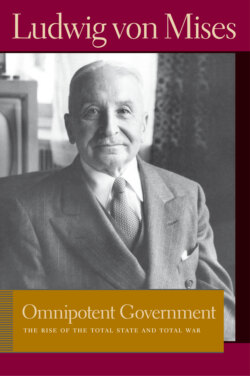Читать книгу Omnipotent Government - Людвиг фон Мизес - Страница 7
На сайте Литреса книга снята с продажи.
FOREWORD TO THE LIBERTY FUND EDITION
ОглавлениеLudwig von Mises, eminent economist, was the leading spokesman for the Austrian School of economics throughout half of the twentieth century. Born in pre–World War I Austria-Hungary, he spent most of his working life in Vienna, teaching at the University of Vienna and advising the Austrian government on economic affairs. He came to the United States in 1940 as a refugee and, at age 59, began a new career writing, lecturing, and teaching in the English language. He was a visiting professor at the New York University Graduate School of Business Administration for twenty-four years. In the course of his long life he made major contributions to man’s understanding of economic theory, money, free markets, business cycles, interventionism, socialism, and the role of government.
Published in 1944, during World War II, Omnipotent Government was Mises’s first book written and published after he arrived in the United States. Several chapters in this book were written by Mises in German between 1938 and 1940, when he was living and teaching in Geneva, Switzerland, and were published later in German as In Namen des Staates (Stuttgart: Bonn Aktuell, 1978). However, Mises wrote Omnipotent Government for an American audience and greatly expanded the book beyond the early German-language manuscript.
The tone of this book reflects a serious Mises, the analytical scientific theoretician we know from his other works. Mises provides in economic terms an explanation of the international conflicts that caused both world wars. Free government at home and peaceful collaboration abroad are impossible when economies and ideas are restricted. Free trade and the freedom of ideas create the only possibility for true liberty. Ideas determine how men act, and history is composed of the actions of men. Furthermore, he holds that ideas cannot be changed by the force of weapons, bayonets, or wars. In the chapter entitled “Nazism as a World Problem,” Mises calls on the Allies to “smash Nazism,” to “fight desperately until the Nazi power is completely broken” (p. 264). By calling on the Allies to “smash Nazism,” he meant that Nazi ideas must be stopped. The minds of the German people must be changed.
Readers of this book should keep in mind that Mises uses “liberal” and “progressive” to refer to liberalism in the classical sense—the philosophy of liberty, free markets, limited government, democracy, and parliamentarianism. And Mises refers throughout to the World War II coalition of Allies, who fought the Axis Powers (Germany, Italy, and Japan), as the “United Nations,” the term they chose for themselves in 1942.
Although written more than a half century ago, Mises’s main theme still stands. Ideas determine history. Etatism, i.e., government interference with the economy, leads to conflicts and wars. The last, best hope for peace is liberalism. And the only hope for liberalism depends on changing the minds of the people. “Etatism is the occupational disease of rulers, warriors, and civil servants. Governments become liberal only when forced to by the citizens” (p. 69).
Bettina Bien Greaves
February 2007
